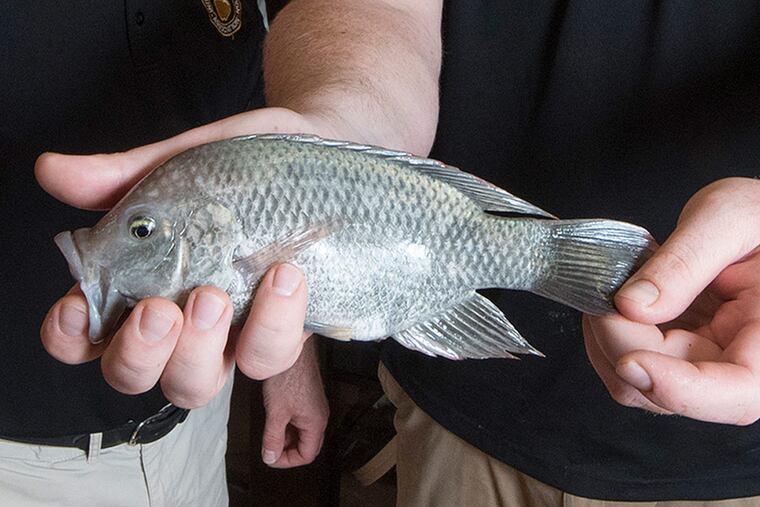Delco high schoolers fish for answers to food questions
Students at Interboro High School in Prospect Park have been known to turn to tech-ed teachers Joe Fisher and Tom Speer with one of life's elemental questions: "Where do cheeseburgers come from?"

Students at Interboro High School in Prospect Park have been known to turn to tech-ed teachers Joe Fisher and Tom Speer with one of life's elemental questions: "Where do cheeseburgers come from?"
In their densely populated Delaware County suburb, where fast food is the cash crop that sprouts from long-ago farms, the answer is not immediately obvious. But what might befuddle some modern youth served to inspire Speer and Fisher.
Last fall, they embarked on a splashy project to teach students about food production and sustainability.
Today, 1,500 tilapia teeming in tanks and large plastic tubs - from small fry barely bigger than a dot to catch-of-the-day-sized adults - have taken over two classrooms at Interboro. Oregano, tomatoes, hot peppers, and greens grow from gravel-filled container lids.
It is, the two believe, the Philadelphia region's first large-scale high school-based program in aquaponics: growing plants and fish together in a recirculating environment where nutrient-rich water from the fish tanks feeds the vegetables.
"The best thing we can teach [students] is how to sustain life," said Fisher, who grew up in the Delco school district. True to his name, he is an avid deep-sea fisherman, with a place in Wildwood and a 15-foot shark among his trophy catches.
So far, the Interboro project has cost $9,000. This year's graduating class donated $3,000, and Fisher and Speer anted up the remainder. But the two teachers are only getting started. They recently applied for a $100,000 state farm grant to be put toward large greenhouses with viewing windows and solar panels to make the process even more sustainable - and pique student interest. More than 80 already have signed up for a new biotechnology class to be offered in the fall.
Speer and Fisher hope to at least double the aquaponics program. As the harvest increases, it will not only nurture the intellectual curiosity of a growing number of students, but also nourish local needy and elderly people, who will receive packages of fish fillets and produce.
In launching the aquaponics program, Interboro joined the burgeoning revolution in urban farming in Philadelphia and other U.S. cities, where underused sites such as abandoned factories or dingy basements have sprung to life with artificial light feeding crops of basil, lettuce, and strawberries.
To start their classroom-based project, Fisher and Speer consulted some of the region's top experts from Cheyney University, whose Herban Farms on its Chester County campus supplies fresh basil weekly to area supermarkets such as Acme, Giant, and Wegman's.
For Interboro students, aquaponics offers unique learning experiences, whether they're testing water chemistry or conducting experiments to determine which temperature or type of light is most conducive to growing crops. At the very least, it gets them thinking about something as basic as the sources of their food.
Speer had learned about aquaponics at Millersville University before coming to the district five years ago. Plus, "I grew up on a farm" in West Chester, he said. "I had fish tanks. I worked in a pet store."
But neither his experiences nor Fisher's years of reeling in marlin and tuna prepared them for the challenges of raising tilapia, a mild, white fish first known to be farmed by ancient Egyptians.
The work of producing thousands of tilapia falls to just a few busy fish: a breeding colony consisting of one male with a Z chromosome, worth the princely sum of $500, and four females with XY chromosomes, which cost a cut-rate couple of dollars each. That combination produces only male tilapia, which grow bigger and more quickly than females. Having a single breeder male also means no fights over mates.
Each female lays her eggs in a terra cotta pot on the bottom of the tank, after which the male swims in and sprays them with sperm. The female returns and scoops up the eggs in her mouth, where she "tumbles" them until they hatch. But in this fish-eat-fish world, the babies wouldn't stand a chance if born among the breeders. So, proving their dedication to the project, Speer and Fisher shake the eggs out of the females' mouths into a man-made tumbler in another tank.
Each female has a couple hundred offspring every week. But the male, for a reason the teachers can't figure out, fertilizes only every other "clutch" of eggs.
The small fry develop tails and become inches-long fingerlings in a few weeks.
As the tilapia - mostly gray pennyfish, but some Niles and light-orange Mozambiques - grow, they graduate from glass tanks into 300-gallon plastic storage tubs, where the largest creature so far, "Bubba," grew to nearly 12 inches.
The container tops were sliced off, turned upside down, and filled with gravel. The fish-tank water is fed into them through a hose to grow the green bounty, which includes lettuce, kale, and a variety of fresh herbs.
The students have participated in every part of the process but one: harvesting the fish. Speer and Fisher throw the fully grown adults into a bucket of ice water, which shocks and kills them.
The final product doesn't exactly answer the students' question about cheeseburgers, but arguably, is as tasty.
"They were delicious, really sweet - we did a fish fry," Speer said. "Even my fiancee likes them, and she's picky."
610-313-8232
@Kathy_Boccella